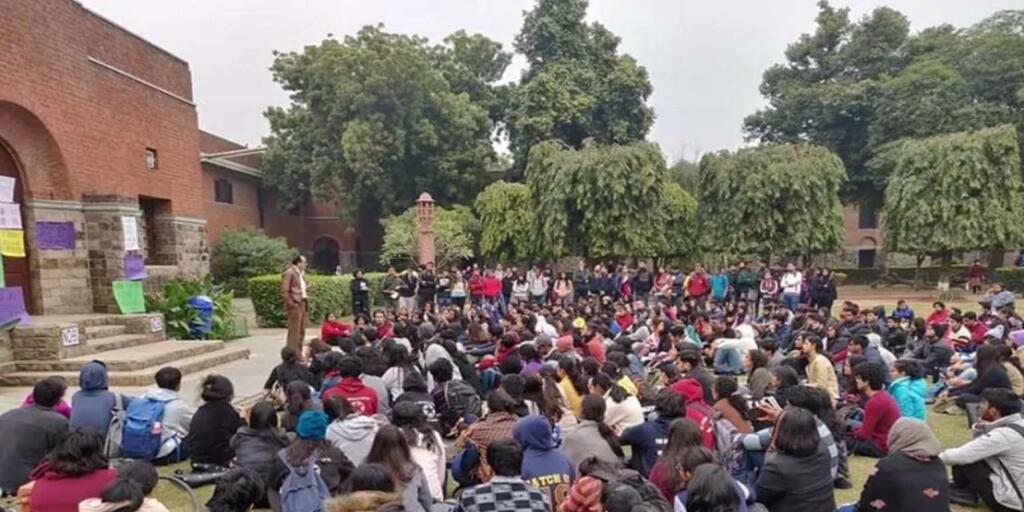It is a fact that those who benefit from the status quo, will vehemently oppose reforms. Politicians, coterie media and certain cartel groups oppose all the reforms that the government tries to bring. For example, to reform the educational system, the Central government brought the New Education Policy which was opposed by people with Status-quo biases. On a similar note, St Stephen’s College is fighting with Delhi University to maintain its autocratic control. Let’s delve in to see what dark deeds lie behind the status quo that St Stephen’s College wants to maintain.
St Stephen’s College is at odds with the Delhi University
St Stephen’s College has released its Prospectus for the year 2022-2023 admissions. According to it, it has allotted 85% weightage to Common University Entrance Test (CUET) and 15% weightage to Interviews of the shortlisted candidates from the CUET. This is in clear contravention to the Delhi University’s directives which insist that admission to college seats should be done only on the basis of CUET scores.
Read More: India is moving towards a more centralized and transparent higher education system
The Interview scoring system leaves a scope of favouritism and an opaque system. As Subjective, Descriptive or Objective exams are more transparent than the interview session where the biases of the interviewer can alter the interviewee’s chances. In the garb of the interview, there are possibilities of favouritism and an attempt to admit only the clique candidates and scope of discrimination on the grounds of religion.
Why St Stephen’s should stop its stern attitude
To increase transparency and uniform process for the whole nation, the government brought the CUET system. Now if St Stephen’s College remains adamant about the interview in the admission process, it may face the wrath of the Delhi University. As Delhi University has already given a clear warning that any admission done “in violation” of DU’s rules will be considered null and void. Furthermore, the Supreme Court in 1991 delivered a verdict on the question of college interviews and the minority status of the college. In a, 4:1, split decision, Justice M Kasliwal made a dissenting judgement and critiqued the college’s practice of conducting interviews.
Read More: Graduate, Undergraduate, Postgraduate no more, UGC is redefining your degrees
In the judgement, Justice Kasliwal wrote, “The method of selection by interview alleged to be in vogue for a long period in St Stephen’s College cannot be considered as so sacrosanct that the same cannot be annulled or changed even when such method does not find approval of the Delhi University. The students who qualify for seeking admission in the degree course are generally of young age of 15 to 17 years and the personality of such students still remains to be developed and as such the only consideration for their admission to degree courses should be their academic performance in the qualifying examination.”
Read More: Stalin’s rhetoric on CUET reeks of Balkanization
Facts about CUET, St Stephen’s College
The Centre brought the CUET to provide a common platform and equal opportunities for candidates across the country to enter the Central Universities through a common examination process. It will be conducted in 13 languages. It is an effort to bring a unified simple process to take admission into the Universities. Further, St Stephen’s College is a Minority college under the Delhi University. It has a 50% reservation for Minority students and enjoys the protection of Article 30. (Right of the minorities to establish and administer educational institutions.
But, It has been observed that many Minority educational institutions have misused the provisions under Article 30. Some educational institutions have used education as a tool to further their Evangelist agenda of Conversion into Christianity. Some of the institutions have forced young minds to convert to Christianity to get better educational opportunities. On the same note, there is a possibility of misuse of this opaque 15% interview weightage by the administration of Stephen’s College.
There has been a long demand by many Hindu Organisations to amend Article 30 as it has been alleged to be a tool to suppress Hindus. This Article 30 is the main bone of contention that St Stephen’s is using as a shield to safeguard this autocratic process. Hence, any scope of misuse of education or Minority laws must be dealt with properly. Additionally, the authorities should undertake a rigorous drive to find out the perpetrators who have misused education whether in schools, colleges or Universities.
